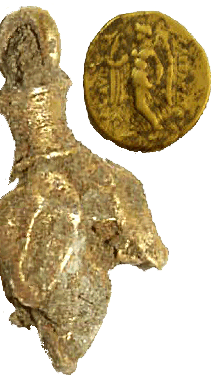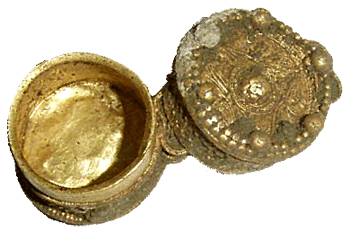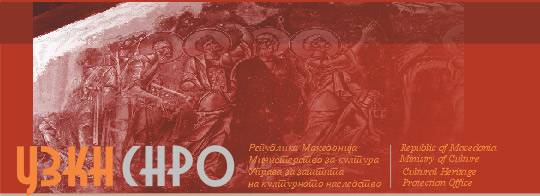7 th INTERNATIONAL SYMPOSIUM ON THE PREVENTION OF THEFT AND ILLICIT TRAFFIC
IN WORKS OF ART, CULTURAL PROPERTY AND ANTIQUES
 The INTERPOL General Secretariat organised the 7 th International Symposium on the Prevention of Theft and Illicit Traffic of Works of Art, Cultural Property and Antiques which took place in Lyon France, from the 17 th until the 19 th of June at which 120 representatives from 40 countries participated. The Macedonian delegation was among the participant country which consisted of Dejan Bocevski and Dejan Nikolovski, representatives of the Ministry of Internal Affairs and Ilco Bojcevski, the Head of the Prevention Unit within the Protection of Cultural Heritage Office. The aim of the Symposium was improve the cooperation among the competent institutions which are part of the process of prevention of illegal trade of cultural goods and antiques. The INTERPOL General Secretariat organised the 7 th International Symposium on the Prevention of Theft and Illicit Traffic of Works of Art, Cultural Property and Antiques which took place in Lyon France, from the 17 th until the 19 th of June at which 120 representatives from 40 countries participated. The Macedonian delegation was among the participant country which consisted of Dejan Bocevski and Dejan Nikolovski, representatives of the Ministry of Internal Affairs and Ilco Bojcevski, the Head of the Prevention Unit within the Protection of Cultural Heritage Office. The aim of the Symposium was improve the cooperation among the competent institutions which are part of the process of prevention of illegal trade of cultural goods and antiques.
Several conclusions were passed at the Symposium which will contribute towards more efficient efforts that will prevent these criminal acts.
Conclusions
Conclusions from the 7 th International Symposium on the Prevention of Theft and Illicit Traffic of Works of Art, Cultural Property and Antiques, Lyon France 17-19 June 2008
Participants at the 7 th International Symposium on the Prevention of Theft and Illicit Traffic of Works of Art, Cultural Property and Antiques which took place in Lyon France, from the 17 th until the 19 th of June
ACKNOWLEDGING the relevance of INTERPOL database of the stolen works of art as a global investigation tool,
AWARE of the need to expand the access to information of this database beyond the law enforcement services, museums, to art market professionals and the general public.
CONSIDERING the need to identify an international network of traffickers in order to transfer the information to the operational law enforcement services,
ALARMED from the increased use of the internet for illicit trade of cultural goods,
NOTING the growth of the use of express delivery companies to deliver cultural object which is mainly due to the trade of cultural objects using the internet,
AWARE of the constant looting of archaeological sites – on the ground and under water,
NOTING the need for national law enforcement services to consult with recognised experts in order to determined the origin and authenticity of cultural objects that could originate from Iraq ,
ALSO NOTING the large number of thefts in religious places and the lack of inventories and security measures for religious property in those places,
NOTING that there is a lack of awareness by the general public in terms of the significance of cultural heritage and the need to protect it,
 The following is recommended to the member states: The following is recommended to the member states:
• Regular update of the General Secretariat database for art works;
• Send all the necessary information to the General Secretariat for the implementation of crime analysis on the international traffickers of cultural property;
• Widely circulate the INTERPOL-UNESCO-ICOM joint letter on the Basic activities for cultural objects that are on offer for sale on the internet, so that concrete activities can be implemented and conclude agreements with the auction platforms in order to decrease illicit sale and monitor this type of sale as effectively as possible;
• Monitor land and underwater archaeological sites and act against the illicit trade subsequent to the looting, by enforcing the relevant legislation in accordance with the current international instruments;
• In case if Iraqi cultural property is seized, the experts from the list prepared by UNESCO which is available on the General Secretariat web page should be contacted prepared list;
• Raise awareness of the owners of cultural property regarding the need to prepare inventory of the property and make agreements for its protection;
RECOMMENDATIONS that the General Secretariat:
Continues with the initiative to allow a more extensive access to the INTERPOL database of stolen art works ИНТЕРПОЛ through the web page;
RECOMMENDATIONS that INTERPOL, UNESCO AND ICOM:
Jointly seek ways to increase the awareness of the law enforcement services and of those who are responsible for safeguarding religious heritage, the major players on the art market and in the conservation world, the general public with the aim to protect cultural property and in the fight against illegal trade. |


